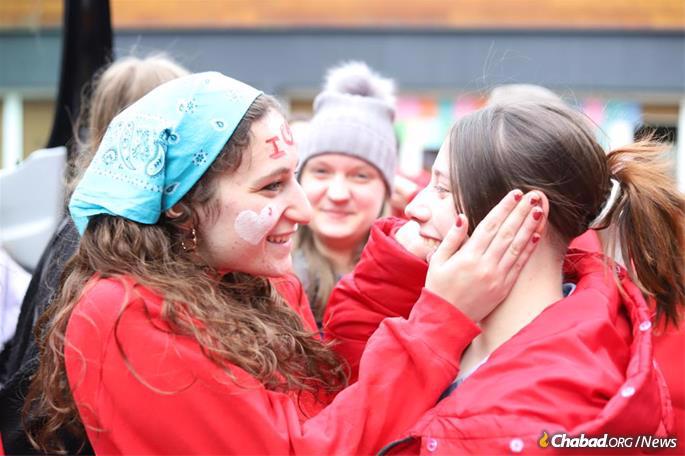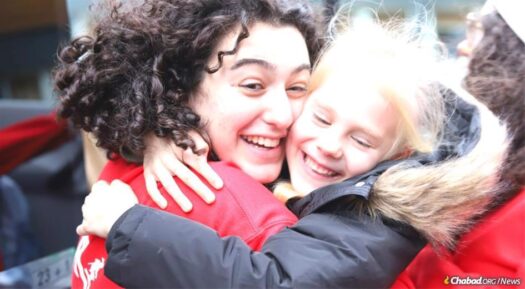
Jewish Girls From Ukraine Find Inspiration and Joy at Roving Winter Camp
by Bruria Efune – chabad.org
While war grinds on in Ukraine and people of all ages contend with cold, darkness and danger, there is one small corner of the country where you’ll hear the sweet sounds of children singing and dancing. Up in the Carpathian Mountains, “Camp Yeka Girls” is in full session.
A look at the camp’s Instagram stories shows the girls jumping off buses and joyfully hugging their counselors. The power is out, but the camp cook is standing over an outdoor fire stove and preparing hot meals. Campers run out on a scavenger hunt, and then create posters and yummy desserts amid giggles and hugs. It’s a very distant reality from where these children were just hours before.
The 50 campers came from all over Ukraine, including Odessa, Kiev, Cherkassky and even Kharkov—a journey of 25 hours by train and bus.
“It’s an extremely dangerous journey,” says Fraidy Thaler, the onsite camp director. “But their parents decided it’s worth the risk for the relief that camp will give them.”
Camp Yeka Girls was founded in 2015 by Hindy Levy and Menucha Hanoka after they volunteered at Chabad of Dnepropetrovsk’s children’s home and saw a need for a summer program. The overnight camp became a much-loved summer home for Jewish girls from around Ukraine—some from cities with very little Jewish presence, and some from broken homes or extreme poverty. The counselors are volunteers—Chabad teens and young women from Europe and the United States, most of whom return year after year, and form a close bond with their campers.
“The staff are beyond amazing, so incredible,” says Hanoka. “They fundraise to pay their own tickets to come and support the camp, then they give their entire heart and soul to these kids. They really love and care for them. After camp, they keep in touch throughout the year.”
When the war broke out in February 2021, for many campers the first instinct was to call their counselors, who in turn connected them with resources on ground or sent care packages. Camp staff compiled a list of 500 campers from past camp sessions and made sure to call all of them, wherever they were. Since then, Camp Yeka Girls has been on the road, making smaller camps in various locations where their campers had been spread out, including Hungary, Poland, Israel and now, for the first time, back in Ukraine.
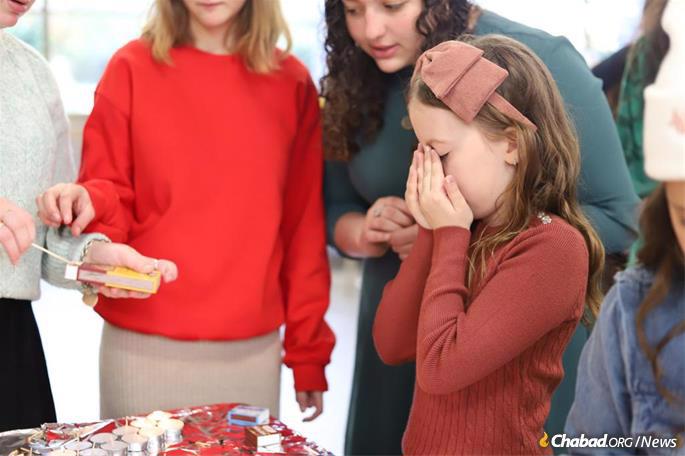
Chanukah Camp in Israel
For the winter break, Camp Yeka Girls first opened a session in Israel during the Chanukah vacation. There, the staff reunited with 80 campers—all refugees from Ukraine—and gave them a week packed with fun, old friends and the comfort of familiarity.
“The kids’ faces light up when they see the counselors,” describes Hanoka. “It’s unreal how happy they are to see them. The counselors are always there for them, and they know it—they need it.”
The campers were able to let loose with entertaining activities, all teaching Jewish themes and traditions, including an exciting concert with their favorite Ukrainian-Jewish musician, Pinchas Tzinman, who had them on their feet, dancing the night away.
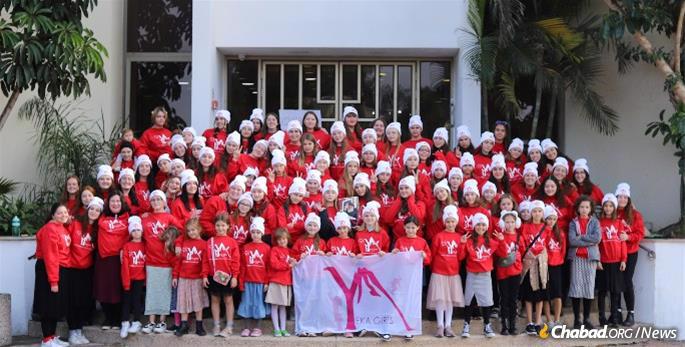
Next Stop: Warsaw
After Israel, the next stop was Poland, where the camp was hosted by Rabbi Sholom and Dina Stambler, directors of Chabad of Warsaw.
Dina Stambler told Chabad.org that she felt privileged to witness the counselors at work and was inspired by their energy, warmth and love for the girls. “It certainly strengthens the girls spiritually, but also physically—their morale, the sense of belonging to a home, to a community that has been so fragile in recent times, it makes it easier for them to continue to face the future and to be proud of who they are.”
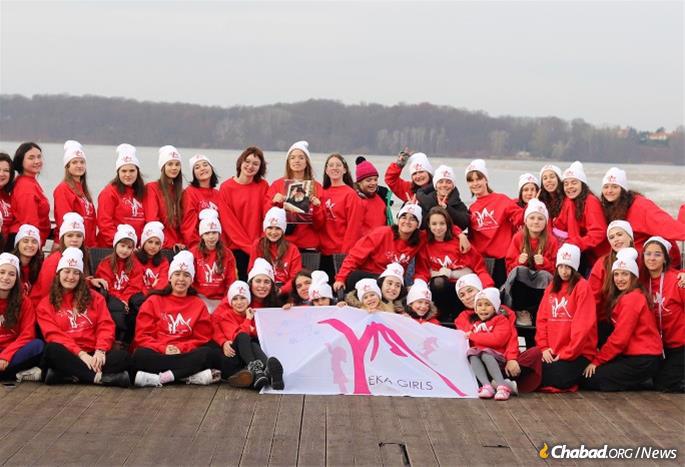
In Warsaw, Camp Yeka welcomed dozens of campers for a five-day session.
“It was so good to see them,” Thaler, who has volunteered in Camp Yeka for six years, told Chabad.org. The last time she had seen the girls was in Hungary, just a couple months after the war broke out. “They’re doing better now; they’re more open and free. They’ve had time to process. It’s a relief.”
Esther Rosenson, a therapist from Jerusalem, joined Camp Yeka in Israel and Poland, and offered guidance and private counseling to the children as well as group therapy sessions.
“In one session, a girl opened up about the night when everything turned upside down for her so suddenly,” says Thaler. “She had woken up hearing bombs and then was told to quickly pack a bag. Moments later, she was on a bus and far away from everything she ever knew. These kids never had a chance to say goodbye to their lives in Ukraine. Some didn’t even have time to pack.”
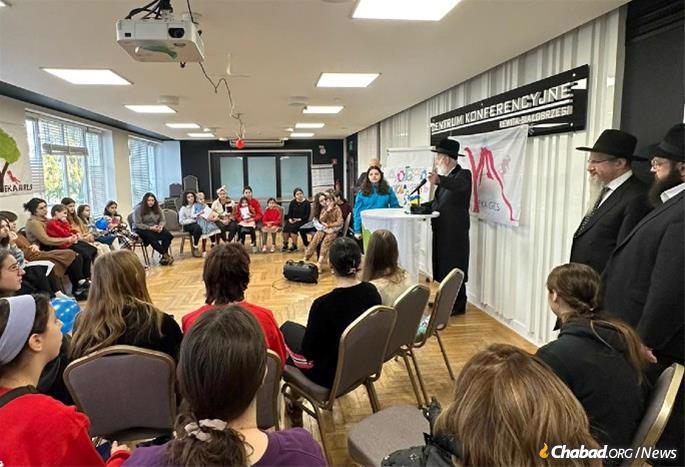
While Rosenson wasn’t able to continue with Camp Yeka’s third winter session, in Ukraine, she and Dr. Dovid Fox of Chai Lifeline prepared the counselors for what they might face as a result of the trauma the campers are still going through. Staff were given guidance for taking care of campers involved in self-harm; how to identify and coach a child through flashbacks or panic attacks, and mostly, how to be unconditionally warm and accepting of the kids as they carry the heavy load of unimaginable war experiences.
“The atmosphere in Ukraine is very depressing,” cautions Rosenson. “The children believe the idea that everyone in the country must be in a state of mourning. They are all on an emotional low. It may take a day or two for them to unwind, and feel safe and comfortable.”
Esther Golomb, another member of the head staff, advised the staff to buy journals for the campers and encourage them to write in them every night. Journal prompts were created by Rosenson to guide the girls’ nightly ritual.
Many of the campers were dumbfounded that their counselors came into Ukraine just for them. One girl jumped off the bus and ran over to Shaina Hecht, the head counselor, and screamed, “I’m shocked that you came!” As they hugged tightly, Hecht reassured her young friend that she would always be there for her, no matter the sacrifice.
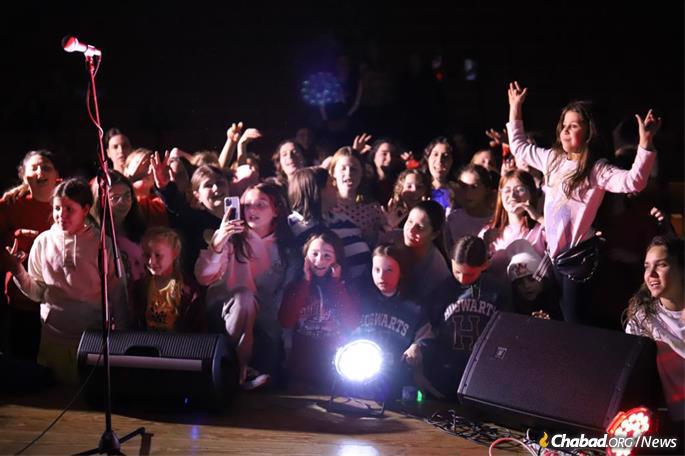
Relative Safety in Ukraine’s Northern Mountains
In the Carpathian Mountains of Ukraine, the campers are safe from the rockets and bombs of the war, though not unaffected by the frequent power outages.
“On the first day the power suddenly went out, but the kids didn’t even pause,” says Thaler. “It’s become normal for them.”
One thing the kids have not become accustomed to is loud sounds. On the train ride to camp, the children tried running away when they heard a sudden noise.
“We need to be careful before making any big noise,” says Hanoka. “When the head counselor was about to pop a balloon, she had to make an announcement and explain to the kids that there would be a sound, but it was OK, they are safe.”
One of the first activities done in the Ukrainian camp had each girl writing down their hopes for the week. One kid wrote: “I want a buffet where I can choose whatever I want to eat.”
Like many others, she had been experiencing food scarcity back home. But now in Camp Yeka, her wish will come true—the staff provide an abundance of delicious food and treats, including three hot meals daily.
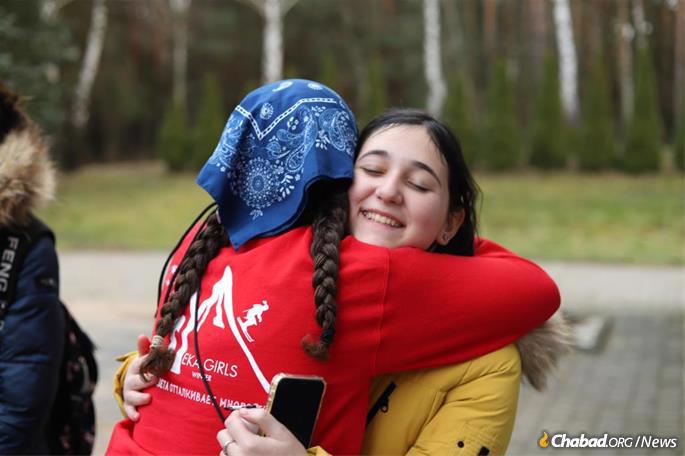
“With the familiarity of their old friends and counselors, the kids feel like they’re safe,” says Hanoka. “They’re having fun, dancing, singing, and most importantly, being showered with unconditional love.”
When life’s circumstances become extremely challenging, explains Golomb, the girls need an anchor to keep their hopes up. “Through different activities and programs, we reinforce the idea that a Jew is never alone and the light of Torah is what guides us through the darkest of times.”
Since the war, operational costs of Camp Yeka Girls have quadrupled, but the need for the camp is greater than ever. You can support the camp here.
Donations to help Chabad of Poland assist refugees from Ukraine can be made here.
